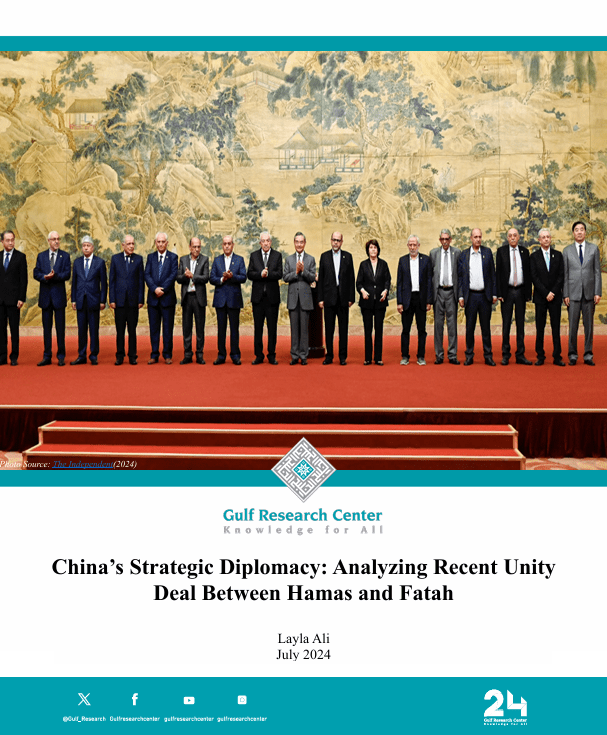Select any text and click on the icon to listen! ByGSpeech
ByGSpeech
 ByGSpeech
ByGSpeech ByGSpeech
ByGSpeech
In a move brokered by China, Fatah and Hamas endorsed a unified government for the West Bank and Gaza by signing a declaration agreement to form an interim 'national reconciliation government' on Tuesday, July 24, 2024. Representatives from the groups and 12 other Palestinian factions pledged to work for unity after three days of talks in Beijing.
Chinese Foreign Ministry describes the signing of the 'Beijing Declaration' on National Unity as a breakthrough and a sign of the country's emerging role as a peace broker in conflicts. In a speech after the talks, Chinese Foreign Minister Wang Yi called it a "historic moment for the cause of the Palestinian's liberation" and highlighted the "consensus around establishing an interim national reconciliation government to manage Gaza after the war."
Within this framework, China proposes a three-step initiative. The first step is to guarantee access to humanitarian aid and ground rescue while working towards a comprehensive, long-lasting, and sustainable ceasefire in the Gaza Strip as soon as feasible. More cooperation between nations is required to stop hostilities and establish a truce. In the second phase, the Chinese government entails working together to establish a post-conflict government in Gaza based on the idea of "Palestinians governing Palestine" and the importance of Gaza as an essential and inseparable component of Palestine and to achieve efficient governance of the West Bank. Thirdly, Beijing emphasized that the international community should help Palestine become a full member state of the UN and provide the technical steps to implement the two-state solution.
China's increasing mediation efforts in the Middle East are driven by several key factors and have implications for the region. Factors include its non-intervention policy, diplomatic strategy, and global security initiatives. China employs a pragmatic approach to mediation, allowing it to adapt to changing circumstances and pursue bilateral or multilateral channels as needed. This flexibility was evident in the mediation between Iran and Saudi Arabia, in which China has so far ensured that both sides remain aligned to achieve mutual interests, encourage positive dialogue, and continue to foster stability. However, while China has been involved in various diplomatic and economic activities, its impact on regional security and its capacity as a 'regional stabilizer' remains to be seen.
The GCC states are closely monitoring China's diplomatic role in the region. The Gulf states, including Saudi Arabia, are keen to see China play a more active role in strategic mediation and other critical areas such as energy partnerships and military supplies. As top energy partners, they recognize the mutual benefits of strengthening their economic ties with China, given its vast demand for oil and gas. Additionally, they are interested in expanding military and defense cooperation, looking to China as a reliable supplier of military and, at times, other sensitive equipment.
However, in the long term, the Gulf states, including the Kingdom, are aware of the limitations of China's diplomacy within the region. China's traditional non-intervention policy and its need to balance relations with other major powers and regional actors, such as the US and Iran, may restrict its ability to fully engage in the Middle East's intricate and often volatile dynamics. This pragmatic understanding influences the Gulf states' strategy to diversify their international partnerships while capitalizing on China's economic and military capabilities.
Brokering another unity deal allows Beijing to position itself in this opportunistic chance to exemplify its role as a reliable partner towards nations and signal the country's potential intent to position itself as a mediator, much like the role it played in the successful brokering of the Saudi Iran deal. This move comes at a time when the US and most European capitals have tried to avoid being seen as impartial actors, creating a vacuum in global diplomacy. While China remains cautious about direct involvement and taking on a clear leadership role, this initiative reflects its strategic exploration of opportunities to enhance its standing as a reliable and neutral arbitrator in international affairs.
Several factors must be highlighted when considering the crisis in Gaza and the challenges China's role as a mediator might face. Firstly, the significant roles of the US and Israel in the region complicate Beijing's ability to mediate effectively, as these countries have longstanding and deep rooted interests that may conflict with Chinese initiatives posed during reconciliation talks. Secondly, it is essential to consider whether the US and the West genuinely desire unity among Palestinian factions and if their involvement in the solution is appropriate or even feasible, which remains questionable. Finally, assessing whether China can bridge the ideological divide between Palestinian factions is crucial, as this gap is deeply entrenched and requires a nuanced understanding and approach. These complexities underscore China's formidable challenges in trying to mediate the Gaza crisis effectively.
Beijing understands that any regional escalation between countries in the Middle East will not be beneficial to China, especially as it depends on regional stability in terms of oil flow from the Gulf via the Hormuz Strait and other maritime chokepoints, as a vital strategic interest. From the perspective of the Gulf, expanding diplomatic relations with China should be different from the search for a replacement for the US as a leading partner. Yet, the current growth in Beijing's diplomatic role is worth exploring regarding how it can support stability in the region.
China should continue to invest in mechanisms that foster higher levels of strategic trust on matters affecting shared fundamental interests. By addressing existing challenges, China can deepen its strategic partnerships with the Gulf states and other regional players, which include solidifying economic ties, enhancing diplomatic engagement, and even expanding military support, which are critical steps in this direction. With such an approach, China can certainly foster long-term regional stability by prioritizing mutual understanding and shared goals.
*Layla Ali is a Researcher at the Gulf Research Center